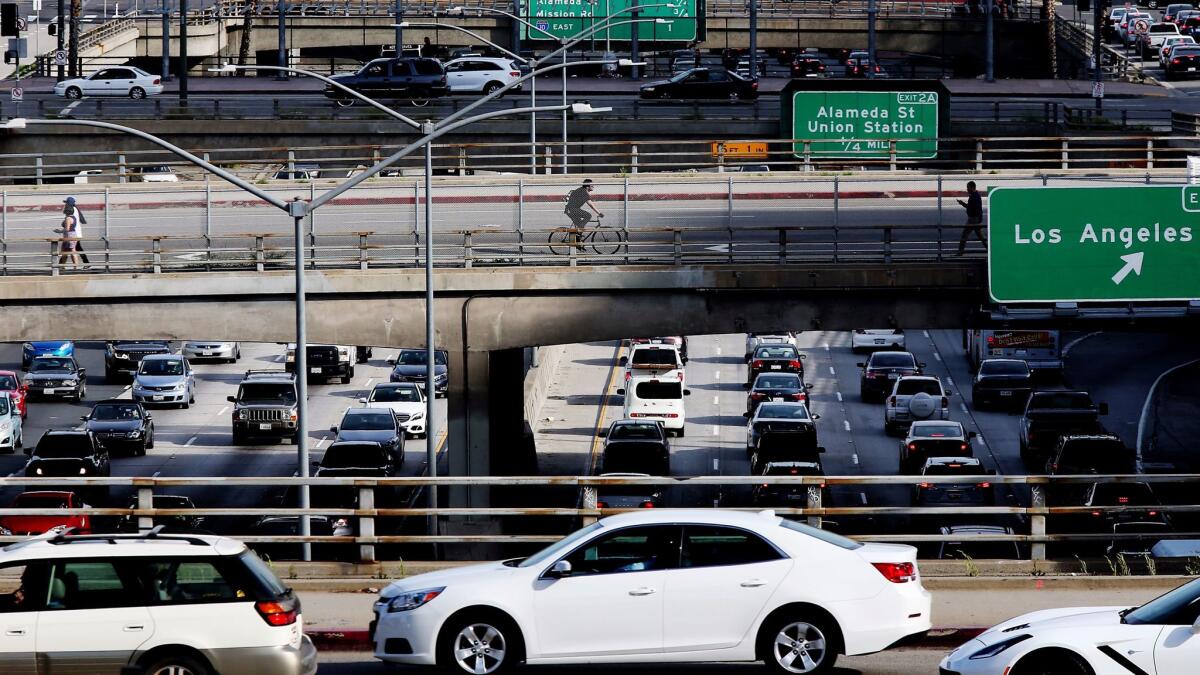Public dumps on Trump plan to reconsider automobile fuel economy standards

- Share via
Reporting from San Francisco — Hurricanes. Wildfires. Heat waves.
Asthma. Bronchitis. Emphysema. Lung cancer. War.
Those specters and more were raised Wednesday at a public hearing in Washington by opponents of a Trump administration plan to consider cutbacks in pollution and fuel economy standards for automobiles and light trucks.
Dozens of people — including environmentalists, academics and a former general in the U.S. Marines — blasted that plan, citing global warming, jobs, and consumer savings among the reasons.
Nearly everyone who offered testimony at the Environmental Protection Agency hearing strongly supported the current standards, which call for a fleet average of about 40 miles per gallon in real-world driving by 2025, up from the mid-20s today.
Among the few supporters of the move to pull the standards for a fresh review were two lobbying groups representing major automakers, both foreign and domestic. Individual auto companies did not speak.
“We need to give manufacturers the flexibility to each pursue the most effective ways to achieve aggressive targets and still meet the needs of their respective customers,” said Julia Rege, environment and energy director for GlobalAutomakers, which represents Toyota, Honda and Hyundai, among others.
The hearing Wednesday came in response to the Trump administration’s decision to reopen for review fuel economy and emissions standards for 2022-25 that automakers agreed to under the Obama administration.
A review was required by April 2018 to assess progress and make adjustments if needed. But days before President Trump was inaugurated, the Obama administration fast-track published its review and set the 2022-25 standards as policy.
The Trump administration wants the review process reopened.
Although Rege did not detail what the automakers might want changed, she called for “one national program” to administer and coordinate regulations. Right now, the U.S. Environmental Protection Agency and the National Highway and Traffic Safety Administration coordinate the regulations, with input from California’s Air Resources Board.
California sets its own standards, which are followed by 11 other states. Under the Obama administration, California and federal regulations were harmonized, and state officials have said California will hold firm with its tougher standards.
Chris Nevins, energy and environment director for the Auto Alliance, said the EPA “needs to reconsider many issues that were not adequately addressed … such as changing market conditions” as well as the methods by which the regulations were crafted.
The general assumption, of course, is that the auto industry wants the real-world 40 mpg standard to be rolled back so automakers can save money and direct it elsewhere — to other investments inside the company, to the direct benefit of shareholders, or both.
“That’s the only reason” the automakers would want a new review, said U.S. Rep. Scott Peters (D-San Diego), who spoke out against the plan.
“The less (gasoline) we use, the less we have to buy, and the less we have to buy, the less we spew into the air,” Peters said. “Right now, we’re ahead of the curve. Let’s stay there.”
Retired Marine Gen. James Conway, chief executive at Securing America’s Future Energy, talked about emissions standards as a national security issue. He said the standards represent “one of the greatest weapons” against reliance on foreign oil.
The U.S. still relies on imports for its oil needs, leaving it vulnerable to foreign national oil companies and the Organization of the Petroleum Exporting Countries. OPEC, several speakers noted, has fought U.S. domestic production in recent years by increasing oil supply and keeping prices low. Fuel savings in the U.S. represent “a preemptive strike against this coalition,” Conway said.
Conway also warned that a political impasse over emission standards is “the last thing we need right now.”
Union representatives came out to support the standards, they said, not only because they reduce emissions, but also because they create jobs.
Dan Boone, president of United Steelworkers Local 970 in Cleveland, said the regulations push innovations that in turn create jobs, such as lightweight steel to improve fuel economy.
“We’re now doing some manufacturing for Tesla and they’re about as green as you can get,” Boone said. “It’s important to keep those standards strong and keep driving innovation.”
Annette Hebert, a division chief at the California Air Resources Board, highlighted other automaker innovations that have improved fuel economy and reduced emissions in recent years, prodded by the federal standards. Small turbocharged engines and “light hybrid” technologies are two examples of many technological advancements that have improved fuel economy from the mid-teens in the 1980s to the mid-20s today.
The EPA has until April 2018 to approve the Obama administration plan or make changes.
Twitter: @russ1mitchell







